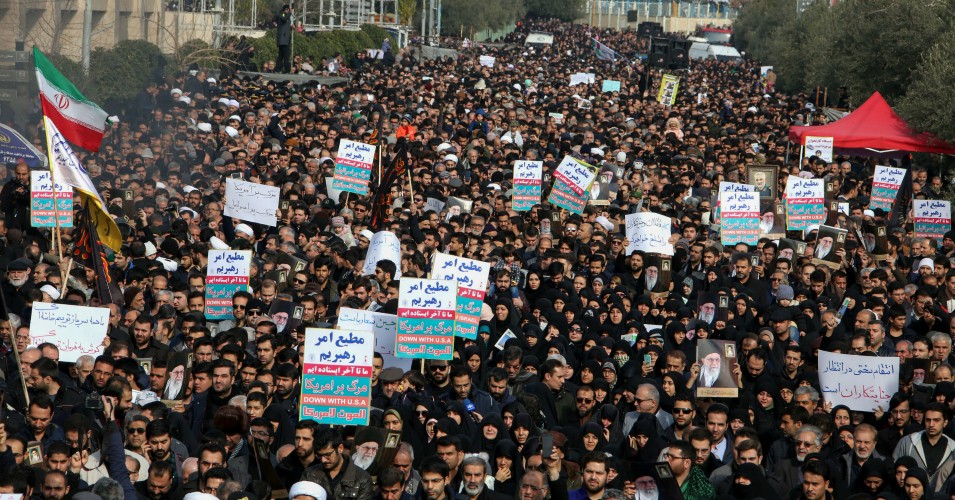Unsurprisingly, the Iraqi parliament has voted to expel all U.S. forces from the country in the wake of the assassination by drone of Iranian commander Qassem Soleimani. Iran’s Press TV reported this morning:
Iraqi lawmakers have unanimously approved a bill, demanding the withdrawal of all foreign military forces led by the United States from the country following the assassination of Iran’s top military commander, Lt. Gen. Qassem Soleimani, and the second-in-command of Iraq’s Popular Mobilization Units (PMU), Abu Mahdi al-Muhandis.
…The lawmakers, citing Articles 59 and 109 of the Constitution and in line with their national and regulatory responsibilities as representatives to safeguard the security and sovereignty of Iraq, had earlier singed a five-point bill as follows:
Firstly, the central government in Baghdad is obliged to cancel its request to the US-led military coalition, which was purportedly fighting the Daesh Takfiri terrorist on the grounds, now that military operations have ended in the country, and victory over Daesh has been achieved. The Iraqi government should therefore put an end to the presence of any foreign troops and prevent the use of the Iraqi airspace.
Secondly, the government and the commander-in-chief of the armed forces must announce the number of foreign trainers they need, along with their locations, responsibilities, and duration of their contracts.
Thirdly, the Iraqi foreign minister, on behalf of the government, must turn to the United Nations and the Security Council to file a complaint against the United States for violations of the Iraqi sovereignty and security.
Fourthly, the Iraqi government has been required to conduct a thorough investigation into the recent US airstrike in Baghdad and inform the parliament of its results within seven days from the date of the approval of this bill.
Finally, the plan comes into force once it obtains the parliamentary approval.
Moqtada Al-Sadr complained that the bill did not go far enough, saying that the U.S. exit should be humiliating, that the U.S. embassy should be closed, and communication with the U.S. criminalized. The parliamentary vote is non-binding and it is up to the executive part of the government to approve its terms.
NPR reported that acting P.M. Abdul-Mahdi, who is set to leave the position amidst recent domestic protests, has recommended that U.S. troops leave:
Iraqi Prime Minister Adil Abdul-Mahdi told parliament that Iraq was grateful for the assistance the U.S. has provided in fighting ISIS, but he is now recommending that the 5,200 U.S. troops stationed there permanently leave the country.
NPR further reported that the acting Iraq PM said that Trump had called him for assistance in mediating with Iran prior to Thursday’s deadly strike in Baghdad. Jane Arrar, co-author of the NPR report stated on her Twitter account that, according to Abdul-Mahdi,’s comments to the Iraqi parliament, Trump appears to have set up the hit on Soleimani with a diplomatic push:
This is stunning – #Iraq prime minister tells parliament US troops should leave. Says @realDonaldTrump called him to ask him to mediate with #Iran and then ordered drone strike on Soleimani. Says Soleimani carrying response to Saudi initiative to defuse tension when he was hit.
Iran expert Trita Parsi reported a translation of Abdul-Mahdi’s words:
“I was supposed to meet Soleimani at the morning the day he was killed, he came to deliver me a message from Iran responding to the message we delivered from Saudi to Iran” Iraqi PM said.”
Joshua Landis, a fellow at the non-interventionist Quincy Institute, commented:
“Iraqi Prime Minister AbdulMahdi accuses Trump of deceiving him in order to assassinate Suleimani. Trump, according to P.M. lied about wanting a diplomatic solution in order to get Suleimani on a plane to Baghdad in the open, where he was summarily executed.
The NYT is reporting that U.S. forces will be halting their anti-ISIS mission in Iraq, at least for the time being:
WASHINGTON — The American-led coalition in Iraq and Syria halted its yearslong campaign against the Islamic State on Sunday as United States forces braced for retaliation from Iran over a strike that killed a powerful Iranian commander, military officials said.
In a statement, the American command said that after repeated attacks on Iraqi and American bases in recent weeks, one of which killed an American contractor on Dec. 27, “we have therefore paused these activities, subject to continuous review.”
The article points out how the turn of events over the past few days is a potential lifeline to ISIS:
The cessation of those missions, to instead focus on security, is likely to allow what remains of the terrorist group to reconstitute itself in the ungoverned spaces where it flourishes, much as it did when Turkey invaded northern Syria in October. Worsening the situation, Iran-backed militias that were also fighting the Islamic State have turned their attention toward the United States.
In terms of possible retaliation, representatives and proxies of Iran have publicly stressed that civilians will not be targeted, only military assets with an aim of getting the U.S. military presence out of the Middle East:
Brigadier General Hossein Dehghan, Iran’s former defense minister and current military adviser to Ayatollah Khamenei, says Iran is not seeking war with the United States and will only target military sites. There are also military targets in the region that could be attacked by Iranian allies including those of the US and its allies such as Israel. General Gholamali Abuhamzeh, the commander of the Revolutionary Guards, said: “Some 35 US targets in the region, as well as Tel Aviv, are within our reach.”
Nasrallah, the leader of Hezbollah said during a speech that American civilians will not be targeted as that would only play into Washington’s hands:
#Nasrallah stresses that American citizens and civilians in the region or anywhere else cannot be harmed. Harming them would only serve #Trump‘s agenda. #Iran #Iraq #QassemSoleimani pic.twitter.com/PryoJtqTeA
— Walid (@walid970721) January 5, 2020
As further background on the Trump administration’s aggression toward Iran, award-winning journalist, Jeremy Scahill, wrote an article for the Intercept outlining how a “cabal” of interests that wanted war with Iran embedded themselves in Trump’s campaign.
On August 3, 2016 — just three months before Donald Trump would win the Electoral College vote and ascend to power — Blackwater founder Erik Prince arranged a meeting at Trump Tower. For decades, Prince had been agitating for a war with Iran and, as early as 2010, had developed a fantastical proposal for using mercenaries to wage it.
At this meeting was George Nader, an American citizen who had a long history of being a quiet emissary for the United States in the Middle East. Nader, who had also worked for Blackwater and Prince, was a convicted pedophile in the Czech Republic and is facing similar allegations in the United States. Nader worked as an adviser for the Emirati royals and has close ties to Mohammed bin Salman, the Saudi crown prince.
There was also an Israeli at the Trump Tower meeting: Joel Zamel. He was there supposedly pitching a multimillion-dollar social media manipulation campaign to the Trump team. Zamel’s company, Psy-Group, boasts of employing former Israeli intelligence operatives. Nader and Zamel were joined by Donald Trump Jr. According to the New York Times, the purpose of the meeting was “primarily to offer help to the Trump team, and it forged relationships between the men and Trump insiders that would develop over the coming months, past the election and well into President Trump’s first year in office.”
One major common goal ran through the agendas of all the participants in this Trump Tower meeting: regime change in Iran. Trump campaigned on belligerence toward Iran and trashing the Obama-led Iran nuclear deal, and he has followed through on those threats, filling his administration with the most vile, hawkish figures in the U.S. national security establishment. After appointing notorious warmonger John Bolton as national security adviser, Trump fired him last September. But despite reports that Trump had soured on Bolton because of his interventionist posture toward Iran, Bolton’s firing merely opened the door for the equally belligerent Mike Pompeo to take over the administration’s Iran policy at the State Department. Now Pompeo is the public face of the Suleimani assassination…
Read the full article here.
From the archive:


